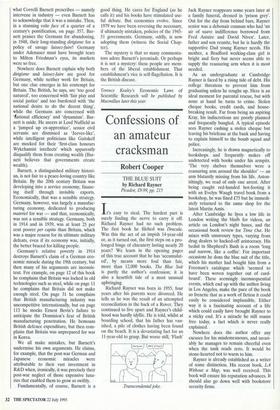Confessions of an amateur cracksman
Robert Cooper
THE BLUE SUIT by Richard Rayner Picador, £9.99, pp. 215 It's easy to steal. The hardest part is surely finding the nerve to carry it off. Richard Rayner had no such problem. The first book he filched was Dracula. Was this the act of an impish 14-year-old or, as it turned out, the first steps on a pro- longed binge of chicanery lasting nearly 20 years? We learn in the opening pages of this true account that he has 'accumulat- ed', by means more foul than fair, more than 12,000 books. The Blue Suit is partly the author's confession; it is also a heartfelt tale of a most unusual upbringing.
Richard Rayner was born in 1955, four years after his parents were divorced. He tells us he was the result of an attempted reconciliation in the back of a Rover. They continued to live apart and Rayner's child- hood was hardly idyllic. He is told, whilst at boarding school, that his father has van- ished, a pile of clothes having been found on the beach. It is a devastating fact for an 11-year-old to grasp. But worse still, 'Flash' Transcendental joke. Jack Rayner reappears some years later at a family funeral, dressed in 'prison grey'. Out for the day from behind bars, Rayner senior was a debonair conman who had `an air of suave indifference borrowed from Fred Astaire and David Niven'. Later, father and son reunite, but he is hardly the supportive Dad young Rayner needs. His mother, a Bradford working-class girl is bright and fiery but never seems able to supply the reassuring arm when it is most needed.
As an undergraduate at Cambridge Rayner is faced by a rising tide of debt. His college threatens to prevent him from graduating unless he coughs up. Here is an ideal moment for parental rescue, but with none at hand he turns to crime. Stolen cheque books, credit cards, and house- breaking result. Far from being an aspiring Kray, his indiscretions are poorly planned and frequently bungled. A typical episode sees Rayner cashing a stolen cheque but leaving his briefcase at the bank and having to explain himself to the bomb squad and police.
Increasingly, he is drawn magnetically to bookshops and frequently makes off undetected with books under his armpits. 'The very shelves themselves were a reassuring arm around the shoulder' — an arm blatantly missing from his life. Aston- ishingly, we read of only one arrest. After being caught red-handed hot-footing it with an Evelyn Waugh travel book from a bookshop, he was fined £75 but he immedi- ately returned to the same shop for the latest Martin Amis.
After Cambridge he byes a low life in London writing the blurb for videos, an article on London's night buses, and the occasional book review for Time Out. He mixes with unsavoury types, varying from drug dealers to hacked-off aristocracy. His bedsit in Shepherd's Bush is a room long and narrow, like a coffin'. For important occasions he dons the blue suit of the title, which his mother had bought him from a Freeman's catalogue which 'seemed to have been woven together out of card- board'. These seemingly inconsequential events, which end up with the author living in Los Angeles, make the pace of the book so frenetic that as a work of fiction it could easily be considered implausible. Either way it is a fascinating account of a life which could easily have brought Rayner to a sticky end. It's a miracle he still roams free today, a fact which is never really explained.
Nowhere does the author offer any excuses for his misdemeanours, and invari- ably he manages to remain cheerful even when the tank reads zero. It would be stone-hearted not to warm to him.
Rayner is already established as a writer of some distinction. His recent book, LA Without a Map, was well received. This book will ensure his reputation advances. It should also go down well with bookstore security firms.


















































 Previous page
Previous page